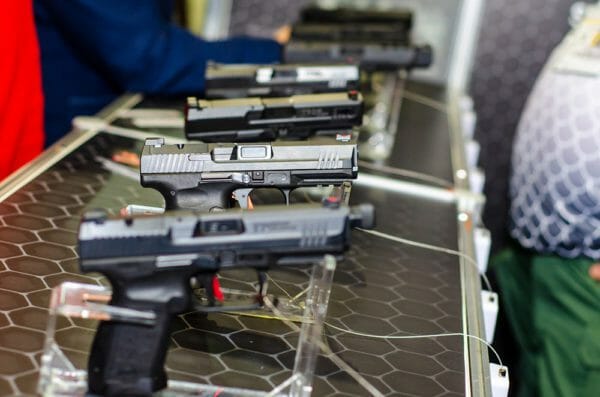
A Kansas judge and 21 state attorneys general have filed a federal lawsuit challenging the Biden administration’s “Final Rule” that changes the definition of “engaged in the business” as a firearms dealer.
The rule is scheduled to take effect this month.
The lawsuit was filed May 1 in U.S. District Court for the Eastern District of Arkansas, Delta Division. Phillip Journey, acting as a private citizen and not in any official capacity, told Ammoland News via telephone he is the lead individual plaintiff in the case.
Signing onto the complaint are the attorneys general of Alabama, Alaska, Arkansas, Kansas, Iowa, Idaho, Indiana, Georgia, Kentucky, Montana, Missouri, Nebraska, New Hampshire, North Dakota, Oklahoma, South Carolina, South Dakota, Tennessee, Virginia, West Virginia and Wyoming, all Republicans. In addition to Journey, other individuals in the lawsuit are identified as Allen Black and Donald Maxey and they are joined by the Chisholm Trail Antique Gun Association.
Named as defendants are the U.S. Justice Department, Bureau of Alcohol, Tobacco, Firearms and Explosives, U.S. Attorney General Merrick B. Garland, and ATF Director Steven Dettelbach, in their official capacities.
The lawsuit asks the court, among other things, to declare the “Final Rule” to be in violation of the Administrative Procedures Act because it was not promulgated “in accordance with the law” and is “arbitrary and capricious and is of no force and effect.”
According to an ATF announcement last month, the Final Rule “clarifies when a person is “engaged in the business” as a dealer in firearms at wholesale or retail by:
- “Clarifying the definition of “dealer,” and defining the terms “purchase,” “sale,” and “something of value” as they apply to dealers;
- adding definitions for the term “personal collection (or personal collection of firearms, or personal firearms collection),” and for “responsible person”;
- setting forth conduct that is presumed to constitute “engaging in the business” of dealing in firearms, and presumed to demonstrate the intent to “predominantly earn a profit” from the sale or disposition of firearms, absent reliable evidence to the contrary, in civil and administrative proceedings;
- clarifying that the intent to “predominantly earn a profit” does not require the person to have received pecuniary gain, and that intent does not have to be shown when a person purchases or sells a firearm for criminal or terrorism purposes;
- clarifying the circumstances when a person would not be presumed to engaged in the business of dealing in firearms, including as an auctioneer, or when purchasing firearms for, and selling firearms from, a personal collection;
- addressing the procedures former licensees, and responsible persons acting on behalf of such licensees, must follow when they liquidate business inventory upon revocation or other termination of their license; and
- clarifying that licensees must follow the verification and recordkeeping procedures in 27 CFR 478.94 and Subpart H, rather than using an ATF Form 4473 when firearms are transferred to other licensees, including transfers by a licensed sole proprietor to that person’s personal collection.”
According to Journey, the new rule essentially “makes us all FFLs if we sell one gun and make one dollar” in profit.
He said the definition is so vague “I don’t see how it can stand.”
The 54-page complaint alleges that the 1986 Firearm Owners Protection Act (FOPA) “narrowed the definition of ‘dealer’ by defining ‘engaged in the business’ as ‘a person who devotes time, attention and labor to dealing in firearms as a regular course of trade or business with the principle objective of livelihood and profit through the repetitive purchase and resale of firearms.”
However, the complaint notes, FOPA “expressly excluded ‘a person who makes occasional sales, exchanges, or purchases of firearms for the enhancement of a personal collection or for a hobby, or who sells all or part of his personal collection of firearms.”
The complaint further recalls that Congress two years ago passed a narrow amendment to the 1968 Gun Control Act which amended the definition of “dealer” in two ways.
“First, it replaced ‘with the principal objective of livelihood and profit’ with ‘to predominantly earn a profit.”
“Second, it defined ‘to predominantly earn a profit’ as an ‘intent underlying the sale or disposition of firearms [that] is primarily one of obtaining pecuniary gain, as opposed to other intents, such as improving or liquidating a personal firearms collection.”
The only difference between the FOPA definition of intent and the definition included in Joe Biden’s Bipartisan safer Communities Act of 2022 was the BSCA’s omission of “livelihood” in the wording, the complaint says.
However, the complaint alleges, “from that tiny seed, the Biden administration and defendant Dettelbach sought to smuggle in the backdoor what Congress had long-refused tro allow in the front door: near universal background checks, with the criminal edges so fuzzy that few individuals would risk private sales of firearms.”
Ammoland reached out to Montana Attorney General Austin Knudsen, who has been involved in several cooperative actions by state attorneys general in defense of Second Amendment rights. Via email, he responded: “This is another attempt by the Biden administration to criminalize law-abiding Montanans for exercising their right to keep and bear arms. I will continue to stand up for our Second Amendment rights and fight the federal overreach coming out of Washington.”
Journey, a veteran gun rights advocate in private life, formerly served in the Kansas Senate, and on the NRA Board of Directors. He asserted, “What they’re trying to do is expand the instant check process to (include) anyone at a gun show.” He is concerned that the Final Rule will allow the government “to selectively prosecute anyone they want.”
The lawsuit asks the court to postpone the effective date of the Final Rule pending judicial review, and, among other things, that this rule “violates rights protected by the Second Amendment and is of no force and effect.” Plaintiffs are also seeking an injunction prohibiting enforcement of the Final Rule.
RELATED:
About Dave Workman
Dave Workman is a senior editor at TheGunMag.com and Liberty Park Press, author of multiple books on the Right to Keep & Bear Arms, and formerly an NRA-certified firearms instructor.







